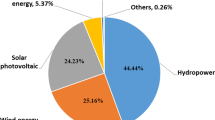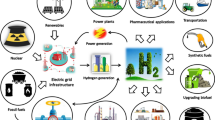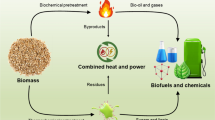Abstract
The environmental burdens of the ethylene oxide production processes are becoming more and more important due to the release of very harmful chemical components as well as its high-energy demand. One way to moderate its environmental burdens within the energy transition period is the natural gas/biomass-based scenarios. However, this Life Cycle Assessment (LCA) study reports that natural gas is not a right alternative for this special case, where natural gas-based scenarios are less sustainable than the residual fuel oil-based scenarios particularly concerning fossil depletion (93%), freshwater ecotoxicity (76%), marine ecotoxicity (59%), human ecotoxicity (53%), terrestrial acidification (51%) and particulate matter formation (40%). On the other hand, the LCA study shows that without revamping the heart of the process technology, the reduction in the environmental burdens is possible through biomass. The biomass-based scenarios reduce the burdens from 4.40 to 4.36 MJ (equivalent of non-renewables) according to Cumulative Exergy Demand or from 2.18E−04 to 1.85E−04 (dimensionless normalized results) in accordance with ReCiPe, preparing the way to a sustainable ethylene oxide process within the energy transition period where revamping the heart of the process technology is not desired.
Graphic abstract







Similar content being viewed by others
Abbreviations
- BM:
-
Biomass
- CC:
-
Climate change
- CED:
-
Cumulative Energy Demand
- CML:
-
Centre of Environmental Sciences—Leiden University
- DALY:
-
Disability-adjusted life years
- EM:
-
Energy mix
- EQ:
-
Ecosystem quality
- ES:
-
Ecosystems
- FD:
-
Fossil depletion
- FE:
-
Freshwater ecotoxicity
- FEW:
-
Freshwater eutrophication
- HH:
-
Human health
- LCA:
-
Life Cycle Assessment
- LCI:
-
Life Cycle Inventory
- LCIA:
-
Life Cycle Impact Assessment
- MCS:
-
Monte Carlo simulation
- NG:
-
Natural gas
- NMVOC:
-
Non-methane volatile organic compounds
- OD:
-
Ozone depletion
- PG:
-
Power generation
- PMF:
-
Particulate matter formation
- POF:
-
Photochemical oxidant formation
- ReCiPe:
-
RIVM (RijksinstituutvoorVolksgezondheiden Milieu) and Radboud University, Centre of Environmental Sciences—Leiden University, and PRé Consultants
- RFO:
-
Residual fuel oil
- SY:
-
species.yr
- TA:
-
Terrestrial acidification
- TE:
-
Terrestrial ecotoxicity
References
Acero AP, Rodríguez C, Ciroth A (2016) LCIA methods—impact assessment methods in Life Cycle Assessment and their impact categories. GreenDelta GmbH, Berlin
Bösch ME, Hellweg S, Huijbregts MA, Frischknecht R (2007) Applying cumulative exergy demand (CExD) indicators to the ecoinvent database. Int J Life Cycle Assess 12:181–190
ChemAnalitica (2009) Harmful substances. Section 4. Heterocyclic compounds. Triplex heterocyclic compounds. ChemAnalitica.com. 1 Apr 2009. Retrieved 21 Sep 2009
Coupard V, Plennevaux T (2016) Thermo-mechanically integrated process for the production of ethylene oxide from a flow of ethanol. Google Patents
Franke M, Berna JL, Cavalli L et al (1995) A life-cycle inventory for the production of petrochemical intermediates in Europe: paraffins, olefins, benzene, ethylene and ethylene oxide. Tenside Surfactants Deterg 32:384–396
Ghannadzadeh A (2018a) Assessment of power generation from natural gas and biomass to enhance environmental sustainability of a polyol ether production process for rigid foam polyurethane synthesis. Renew Energy 115:846–858. https://doi.org/10.1016/j.renene.2017.07.059
Ghannadzadeh A (2018b) Exergy-aided environmental sustainability assessment of an ethylene dichloride–vinyl chloride production process. Chem Eng Res Des 130:109–128. https://doi.org/10.1016/j.cherd.2017.08.016
Ghannadzadeh A, Sadeqzadeh M (2016a) Exergy analysis as a scoping tool for cleaner production of chemicals: a case study of an ethylene production process. J Clean Prod 129:508–520. https://doi.org/10.1016/j.jclepro.2016.04.018
Ghannadzadeh A, Sadeqzadeh M (2016b) Evaluation of an alternative chlorine production process for energy saving toward sustainability. Environ Prog Sustain Energy 35:1512–1520. https://doi.org/10.1002/ep.12374
Ghannadzadeh A, Sadeqzadeh M (2016c) Diagnosis of an alternative ammonia process technology to reduce exergy losses. Energy Convers Manag 109:63–70. https://doi.org/10.1016/j.enconman.2015.11.040
Ghannadzadeh A, Sadeqzadeh M (2017a) Exergy aided pinch analysis to enhance energy integration towards environmental sustainability in a chlorine-caustic soda production process. Appl Therm Eng 125:1518–1529. https://doi.org/10.1016/j.applthermaleng.2017.07.052
Ghannadzadeh A, Sadeqzadeh M (2017b) Combined pinch and exergy analysis of an ethylene oxide production process to boost energy efficiency toward environmental sustainability. Clean Technol Environ Policy 19:2145–2160. https://doi.org/10.1007/s10098-017-1402-5
Ghannadzadeh A, Sadeqzadeh M (2018) Toward an environmentally sustainable natural gas-based ethylene production process through exergy-aided pinch analysis. Asia-Pac J Chem Eng 13:e2204. https://doi.org/10.1002/apj.2204
Ghannadzadeh A, Sadeqzadeh M (2019) Cleaner production of purified terephthalic and isophthalic acids through exergy analysis. Int J Exergy. https://www.inderscience.com/info/ingeneral/forthcoming.php?jcode=ijex
Ghannadzadeh A, Tarighaleslami AH (2019) Exergetic environmental sustainability assessment supported by Monte Carlo simulations: a case study of a chlorine production process. Environ Prog Sustain Energy. https://doi.org/10.1002/ep.13179
Ghannadzadeh A, Thery-Hetreux R, Baudouin O et al (2012) General methodology for exergy balance in ProSimPlus® process simulator. Energy 44:38–59. https://doi.org/10.1016/j.energy.2012.02.017
Glaser JA (2012) Chemical processes and sustainability. Clean Technol Environ Policy 14:1023–1028. https://doi.org/10.1007/s10098-012-0542-x
Global and China Ethylene Oxide (EO) Industry Report (2017–2021). https://www.reportsnreports.com/reports/1129272-global-and-china-ethylene-oxide-eo-industry-report-2017-2021.html
Goedkoop M, Effting S, Collignon M (2000) The eco-indicator 99: a damage oriented method for life-cycle impact assessment: manual for designers. PRé Consultants
Goedkoop M, Heijungs R, Huijbregts M, De Schryver A, Struijs J, van Zelm R (2009) ReCiPe 2008: a life cycle impact assessment method which comprises harmonised category indicators at the midpoint and the endpoint level (First edition)
Goedkoop M, Heijungs R, Huijbregts M, et al (2013) A life cycle impact assessment method which comprises harmonised category indicators at the midpoint and the endpoint level. https://sites.google.com/site/lciarecipe/file-cabinet. Accessed 12 Feb 2019
Guinée JB (2002) Handbook on life cycle assessment operational guide to the ISO standards. Int J Life Cycle Assess 7:311–313
Heijungs R, Kleijn R (2001) Numerical approaches towards life cycle interpretation five examples. Int J Life Cycle Assess 6:141–148
ISO I (2006) 14040 International standard. Environment Management Cycle Assessment–Principles Framework International Organisation Stands, Geneva
Jia X, Li Z, Wang F, Qian Y (2016) Integrated sustainability assessment for chemical processes. Clean Technol Environ Policy 18:1295–1306. https://doi.org/10.1007/s10098-015-1075-x
Klemeš JJ (2015) Assessing and measuring environmental impact and sustainability. Clean Technol Environ Policy 17:577–578. https://doi.org/10.1007/s10098-015-0930-0
Kralisch D, Ott D, Gericke D (2015) Rules and benefits of Life Cycle Assessment in green chemical process and synthesis design: a tutorial review. Green Chem 17:123–145
Kravanja Z, Varbanov PS, Klemeš JJ (2015) Recent advances in green energy and product productions, environmentally friendly, healthier and safer technologies and processes, CO2 capturing, storage and recycling, and sustainability assessment in decision-making. Clean Technol Environ Policy 17:1119–1126. https://doi.org/10.1007/s10098-015-0995-9
Lee H-J, Ghanta M, Busch DH, Subramaniam B (2010) Toward a CO2-free ethylene oxide process: homogeneous ethylene oxide in gas-expanded liquids. Chem Eng Sci 65:128–134
López VP (2013) Decision analysis for comparative life cycle assessment. Arizona State University
Lu X, Zhou W-J, Wu H et al (2016) Selective synthesis of ethylene oxide through liquid-phase epoxidation of ethylene with titanosilicate/H2O2 catalytic systems. Appl Catal Gen 515:51–59
Mazanec T, Desmukh S, Silva LJ et al (2013) Process for making ethylene oxide using microchannel process technology. Google Patents
McDonald A (1995) Some Industrial Chemicals: IARC Monographs on the Evaluation of Carcinogenic Risks to Humans. Vol 60. Occup Environ Med 52:360
Monteiro JGM-S, de Queiroz Fernandes Araújo O, de Medeiros JL (2009) Sustainability metrics for eco-technologies assessment, part II. Life cycle analysis. Clean Technol Environ Policy 11:459–472. https://doi.org/10.1007/s10098-009-0205-8
Müller-Wenk R (1998) Depletion of abiotic resources weighted on the base of “virtual” impacts of lower grade deposits in future. IWÖ Diskussionsbeitrag Nr. 57, Universität St. Gallen, March 1998. ISBN 3-906502-57-0
NREL (2014) US Life-Cycle Inventory Database. In: National Renewable Energy Laboratory. http://www.nrel.gov/lci/. June 2014
openLCA (2014). openLCA 1.4 case study of a beer bottle: aluminium can vs PET bottle. http://www.openlca.org/wp-content/uploads/2015/11/141031_LSA-Case-study_Beer-containers_PET-vs-ALU.pdf. Accessed 13 Feb 2019
openLCA (2016). In: http://www.openlca.org/. Accessed 24 Sep 2016
Prasara-A J, Gheewala SH, Silalertruksa T et al (2019) Environmental and social life cycle assessment to enhance sustainability of sugarcane-based products in Thailand. Clean Technol Environ Policy. https://doi.org/10.1007/s10098-019-01715-y
PRé Consultants (2016) SimaPro database manual methods library
ReCiPe Normalization 2000 Factors (2010). https://sites.google.com/site/lciarecipe/file-cabinet
Ruiz-Mercado GJ, Smith RL, Gonzalez MA (2012) Sustainability indicators for chemical processes: I. Taxonomy. Ind Eng Chem Res 51:2309–2328. https://doi.org/10.1021/ie102116e
Sikdar SK (2007) Sustainability and recycle–reuse in process systems. Clean Technol Environ Policy 9:167–174. https://doi.org/10.1007/s10098-007-0087-6
Simmons HL, Lewis RJ (1997) Building materials: dangerous properties of products in MASTERFORMAT Divisions 7 and 9. Wiley, Hoboken
Sleeswijk AW, van Oers LF, Guinée JB et al (2008) Normalisation in product life cycle assessment: an LCA of the global and European economic systems in the year 2000. Sci Total Environ 390:227–240
Tarighaleslami AH, Omidkhah MR, Ghannadzadeh A, Hesas RH (2012) Thermodynamic evaluation of distillation columns using exergy loss profiles: a case study on the crude oil atmospheric distillation column. Clean Technol Environ Policy 14:381–387. https://doi.org/10.1007/s10098-012-0465-6
Townsend et al (2014) https://articles.extension.org/pages/70456/poplar-populus-spp-trees-for-biofuel-production. Accessed 25 Sep 2019
Author information
Authors and Affiliations
Corresponding author
Additional information
Publisher's Note
Springer Nature remains neutral with regard to jurisdictional claims in published maps and institutional affiliations.
Electronic supplementary material
Below is the link to the electronic supplementary material.
Rights and permissions
About this article
Cite this article
Ghannadzadeh, A., Meymivand, A. Environmental sustainability assessment of an ethylene oxide production process through Cumulative Exergy Demand and ReCiPe. Clean Techn Environ Policy 21, 1765–1777 (2019). https://doi.org/10.1007/s10098-019-01748-3
Received:
Accepted:
Published:
Issue Date:
DOI: https://doi.org/10.1007/s10098-019-01748-3




